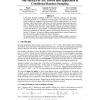Free Online Productivity Tools
i2Speak
i2Symbol
i2OCR
iTex2Img
iWeb2Print
iWeb2Shot
i2Type
iPdf2Split
iPdf2Merge
i2Bopomofo
i2Arabic
i2Style
i2Image
i2PDF
iLatex2Rtf
Sci2ools
132
click to vote
NIPS
2008
2008
One sketch for all: Theory and Application of Conditional Random Sampling
Conditional Random Sampling (CRS) was originally proposed for efficiently computing pairwise (l2, l1) distances, in static, large-scale, and sparse data. This study modifies the original CRS and extends CRS to handle dynamic or streaming data, which much better reflect the real-world situation than assuming static data. Compared with many other sketching algorithms for dimension reductions such as stable random projections, CRS exhibits a significant advantage in that it is "one-sketch-for-all." In particular, we demonstrate the effectiveness of CRS in efficiently computing the Hamming norm, the Hamming distance, the lp distance, and the 2 distance. A generic estimator and an approximate variance formula are also provided, for approximating any type of distances. We recommend CRS as a promising tool for building highly scalable systems, in machine learning, data mining, recommender systems, and information retrieval.
Conditional Random Sampling | Information Technology | NIPS 2008 | Original Crs | Stable Random Projections |
Related Content
| Added | 29 Oct 2010 |
| Updated | 29 Oct 2010 |
| Type | Conference |
| Year | 2008 |
| Where | NIPS |
| Authors | Ping Li, Kenneth Ward Church, Trevor Hastie |
Comments (0)

